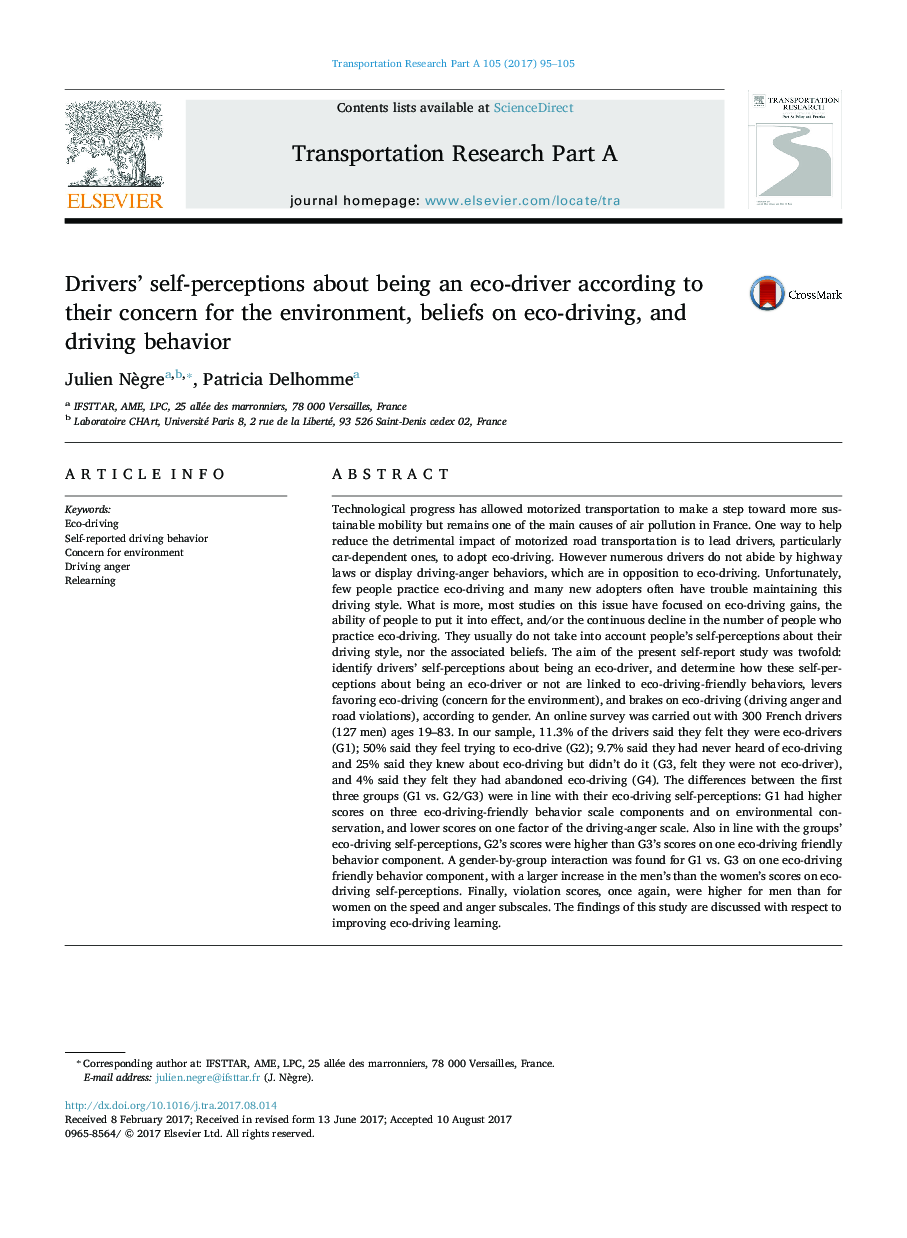| کد مقاله | کد نشریه | سال انتشار | مقاله انگلیسی | نسخه تمام متن |
|---|---|---|---|---|
| 4928851 | 1432195 | 2017 | 11 صفحه PDF | دانلود رایگان |
عنوان انگلیسی مقاله ISI
Drivers' self-perceptions about being an eco-driver according to their concern for the environment, beliefs on eco-driving, and driving behavior
ترجمه فارسی عنوان
خودآزمایی رانندگان در مورد داشتن یک راننده زیست محیطی با توجه به نگرانی آنها در مورد محیط زیست، اعتقاد به رانندگی در محیط زیست و رفتار رانندگی
دانلود مقاله + سفارش ترجمه
دانلود مقاله ISI انگلیسی
رایگان برای ایرانیان
کلمات کلیدی
رانندگی با محیط زیست، رفتار رانندگی خود گزارش شده، نگرانی برای محیط زیست، رانندگی خشم، بازنشستگی،
موضوعات مرتبط
مهندسی و علوم پایه
سایر رشته های مهندسی
مهندسی عمران و سازه
چکیده انگلیسی
Technological progress has allowed motorized transportation to make a step toward more sustainable mobility but remains one of the main causes of air pollution in France. One way to help reduce the detrimental impact of motorized road transportation is to lead drivers, particularly car-dependent ones, to adopt eco-driving. However numerous drivers do not abide by highway laws or display driving-anger behaviors, which are in opposition to eco-driving. Unfortunately, few people practice eco-driving and many new adopters often have trouble maintaining this driving style. What is more, most studies on this issue have focused on eco-driving gains, the ability of people to put it into effect, and/or the continuous decline in the number of people who practice eco-driving. They usually do not take into account people's self-perceptions about their driving style, nor the associated beliefs. The aim of the present self-report study was twofold: identify drivers' self-perceptions about being an eco-driver, and determine how these self-perceptions about being an eco-driver or not are linked to eco-driving-friendly behaviors, levers favoring eco-driving (concern for the environment), and brakes on eco-driving (driving anger and road violations), according to gender. An online survey was carried out with 300 French drivers (127Â men) ages 19-83. In our sample, 11.3% of the drivers said they felt they were eco-drivers (G1); 50% said they feel trying to eco-drive (G2); 9.7% said they had never heard of eco-driving and 25% said they knew about eco-driving but didn't do it (G3, felt they were not eco-driver), and 4% said they felt they had abandoned eco-driving (G4). The differences between the first three groups (G1Â vs. G2/G3) were in line with their eco-driving self-perceptions: G1 had higher scores on three eco-driving-friendly behavior scale components and on environmental conservation, and lower scores on one factor of the driving-anger scale. Also in line with the groups' eco-driving self-perceptions, G2's scores were higher than G3's scores on one eco-driving friendly behavior component. A gender-by-group interaction was found for G1Â vs. G3 on one eco-driving friendly behavior component, with a larger increase in the men's than the women's scores on eco-driving self-perceptions. Finally, violation scores, once again, were higher for men than for women on the speed and anger subscales. The findings of this study are discussed with respect to improving eco-driving learning.
ناشر
Database: Elsevier - ScienceDirect (ساینس دایرکت)
Journal: Transportation Research Part A: Policy and Practice - Volume 105, November 2017, Pages 95-105
Journal: Transportation Research Part A: Policy and Practice - Volume 105, November 2017, Pages 95-105
نویسندگان
Julien Nègre, Patricia Delhomme,
